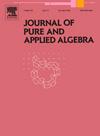中心h空间和带状类型
IF 0.7
2区 数学
Q2 MATHEMATICS
引用次数: 0
摘要
我们引入并研究了中心类型,它是Eilenberg-Mac Lane空间的推广。当一个类型在它自己的自我等价中等价于同一性的组成部分时,它就是中心的。仅从中心性出发,我们用带型张量积构造了一个无限展开,带型张量积是中心型扭量的适当概念。我们的构造是在同伦类型理论中进行的,因此在任何∞-拓扑上都成立。即使被解释为空间的∞拓扑,我们构建这些发展的方法也是新的。在此过程中,我们进一步发展了同伦型理论中的h空间理论,包括它们与评价颤振和Whitehead积的关系。这些考虑让我们,例如,在n>;0的情况下,排除2n球上h空间结构的存在。我们还给出了h空间上h空间结构的模空间的一种新的描述。利用这一描述,我们推广了Arkowitz-Curjel和Copeland计算该模空间路径分量的公式。作为应用,我们推导出3球上h空间结构的模空间为Ω6S3。本文章由计算机程序翻译,如有差异,请以英文原文为准。
Central H-spaces and banded types
We introduce and study central types, which are generalizations of Eilenberg–Mac Lane spaces. A type is central when it is equivalent to the component of the identity among its own self-equivalences. From centrality alone we construct an infinite delooping in terms of a tensor product of banded types, which are the appropriate notion of torsor for a central type. Our constructions are carried out in homotopy type theory, and therefore hold in any ∞-topos. Even when interpreted into the ∞-topos of spaces, our approach to constructing these deloopings is new.
Along the way, we further develop the theory of H-spaces in homotopy type theory, including their relation to evaluation fibrations and Whitehead products. These considerations let us, for example, rule out the existence of H-space structures on the 2n-sphere for . We also give a novel description of the moduli space of H-space structures on an H-space. Using this description, we generalize a formula of Arkowitz–Curjel and Copeland for counting the number of path components of this moduli space. As an application, we deduce that the moduli space of H-space structures on the 3-sphere is .
求助全文
通过发布文献求助,成功后即可免费获取论文全文。
去求助
来源期刊
CiteScore
1.70
自引率
12.50%
发文量
225
审稿时长
17 days
期刊介绍:
The Journal of Pure and Applied Algebra concentrates on that part of algebra likely to be of general mathematical interest: algebraic results with immediate applications, and the development of algebraic theories of sufficiently general relevance to allow for future applications.

 求助内容:
求助内容: 应助结果提醒方式:
应助结果提醒方式:


